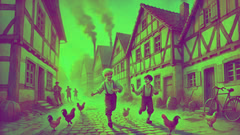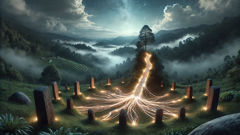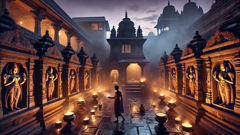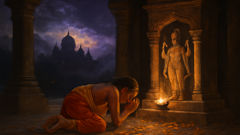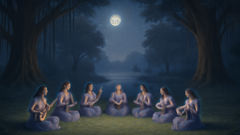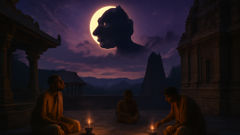Introduction
Beneath the undulating green hills and patchwork fields of rural Germany, there once nestled a village where the scent of fresh bread drifted from the ovens at dawn and the laughter of children echoed off cobblestone lanes. Here, in the waning decades of the nineteenth century, lived Max and Moritz—two boys as inseparable as their names, bound together by mischief and an insatiable appetite for adventure. With tousled hair, patched trousers, and twinkles of trouble in their eyes, they darted through the village like errant sprites, their pockets stuffed with slingshots, frogs, and whatever ill-gotten contraptions they’d devised that morning. Theirs was a world alive with possibility and peril, shaped by the ancient forests and meandering rivers that hemmed the boundaries of their domain. To the villagers—tailors and bakers, millers and old widows—Max and Moritz became both scourge and spectacle. Stories of their exploits traveled faster than the morning milk wagon: a string of sausages hung from the church bell; a baker’s prized loaf vanished in a puff of flour; the schoolmaster’s hat, somehow, found perched atop a frightened goose. It was the sort of harmless, gleeful mischief that could only sprout in the fertile soil of childhood—or so it seemed at first. What began as laughter and lighthearted complaints soon curdled into wariness, then worry. For every prank left a trace—a broken window, a startled neighbor, a ruffled sense of order. The village, with its proud traditions and deep-rooted customs, had always relied on a delicate balance. As Max and Moritz pressed further, daring bolder tricks, their shadow stretched longer over the fields and lanes. This is the story of their rise and fall—a tale woven into German folklore, where humor masks a deeper warning and where every jest, sooner or later, must pay its price.
The Seeds of Mischief
Max and Moritz were not ordinary village boys. From the earliest days, they seemed drawn to chaos as moths to a lantern. They lived as next-door neighbors in two squat houses on the edge of the village square, their bedrooms divided only by a thin hedge and a shared window ledge. In summer, they’d whisper across that gap after dark, plotting and giggling until the moon rose high. In winter, they’d meet before dawn, their breath hanging in icy clouds as they tramped through the frost to check their traps or sketch plans in the snow.
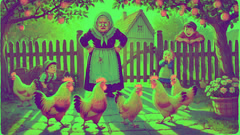
The source of their mischief was part cleverness, part boredom. The school was strict, lessons droned on, and the world outside bristled with temptations. Max, with his unruly black hair and quick wit, could spin a tale or concoct a plan for any occasion. Moritz, fair-haired and nimble, had a knack for climbing, sneaking, and slipping from sight when adults approached. Their partnership was perfect—a union of brains and agility, daring and audacity.
The first prank to rattle the village began with Widow Bolte’s chickens. The widow, a stern woman who kept her yard swept clean as a whistle, prized her plump hens above all. One crisp morning, she awoke to find her flock in utter disarray: feathers scattered, feed pails overturned, and every hen sporting a bright red ribbon tied to its tail. The hens strutted about like carnival queens, drawing laughter and stares from passersby. Widow Bolte, furious and bewildered, could only suspect Max and Moritz, though she had no proof—only the echoes of laughter that seemed to follow the boys wherever they went.
Encouraged by their success, the boys set their sights higher. Herr Bäcker, the baker, had a reputation for being miserly and gruff. His windows were always shuttered, his loaves perfectly aligned, and his rules ironclad. One market day, he found his prized rye loaf missing and a row of sugar-dusted footprints leading from his shop to the riverbank. There, perched atop a stone, sat Max and Moritz, sharing the bread between them and tossing crumbs to delighted ducks. When Herr Bäcker stormed after them, he slipped on the muddy bank and landed squarely in the river. The village howled with laughter for days, but Herr Bäcker’s glare grew colder, his shutters tighter.
No one was safe from the boys’ schemes. The schoolmaster, Herr Lamprecht, a man who prided himself on discipline, found his lesson plans replaced by crude drawings. The tailor’s laundry lines collapsed in a heap, his best shirts tangled with nettles and mud. The miller’s prized goat, lured with apples, ended up in the bell tower, bleating loudly as the village gathered in confusion. Each incident was followed by a chorus of whispers—“Max und Moritz!”—spoken with equal parts admiration and dread.
Yet for all their antics, there was something infectious about the boys’ laughter. The old men at the tavern recalled their own youthful escapades; the young children trailed after Max and Moritz, hoping to witness the next spectacle. The village became a stage, and the boys its unruly jesters, dancing at the edge of disaster. But beneath the mirth, a slow tension gathered, a sense that the balance between play and punishment, fun and fear, was tilting dangerously.
Escalation and Consequence
As the months rolled on, Max and Moritz’s pranks became bolder, their ambition only matched by the mounting frustration of their neighbors. What began as harmless tricks now grew sharper, laced with a streak of rebellion against the rules that shaped their world. The village, once content to chuckle at their antics, now watched them with wary eyes and muttered warnings.
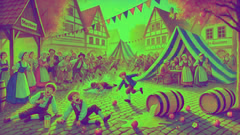
Their next target was the pious Herr Lehrer Lamprecht, whose lessons on discipline and propriety were legendary among the children. One morning, Lamprecht arrived at school to find his desk glued shut and his beloved quill pen dangling from the rafters by a thread of spider silk. As he struggled to free his things, the children erupted in laughter, and Max and Moritz exchanged triumphant grins from the back row. That afternoon, Lamprecht stormed through the village, his patience finally snapped. “Enough!” he cried. “These boys must learn respect!”
But the boys remained undaunted. At the annual harvest festival—a riot of music, cider, and roasted sausages—they orchestrated their most audacious prank yet. In the dead of night, they crept into the festival grounds and loosened the pegs on every tent. When the first breeze swept across the square at sunrise, tents collapsed in a cacophony of shouts, flour clouds, and rolling apples. The festival descended into chaos. At first, there was laughter, but as the damage was tallied—broken crockery, ruined produce, tears from children whose cakes had been trampled—the mood turned grim.
The villagers convened a meeting in the great hall. Voices rose in anger; fists pounded on tables. The parents of Max and Moritz defended their sons, pleading that they were only children testing their limits. But Herr Lamprecht, Herr Bäcker, Widow Bolte, and others demanded justice. “If we allow this to go on,” warned the miller, “what will become of our village? Where is the line between laughter and lawlessness?”
That night, the boys slipped through the moonlit fields, eavesdropping on the angry voices that drifted from windows left ajar. For the first time, doubt flickered in their eyes. They retreated to their secret hideout—a hollow beneath a gnarled oak at the edge of the forest—and whispered into the darkness. “Did we go too far?” Moritz asked, voice small. Max hesitated, then shook his head. “They’ll forgive us. They always do.” But his words lacked conviction.
The next day brought a chilling surprise. Notices appeared on every door: anyone caught aiding Max and Moritz would be punished. No bread from the bakery, no sweets from the grocer, no scraps from the tavern. The boys, once beloved rascals, became outcasts overnight. Their friends avoided them, fearful of reprisal. Even their parents, hearts heavy with shame and worry, forbade them from leaving the house.
But the urge for mischief was not so easily quenched. Hungry and restless, Max and Moritz plotted one final prank—a plan so daring it would restore their reputation or doom them forever. They would break into Herr Bäcker’s bakery and steal the secret recipe for his famed honey cake, leaving behind a mocking note signed with their initials. The plan was reckless; they knew it. But desperation sharpened their courage. In the black hours before dawn, they crept through the shadows, hearts pounding.
Inside the bakery, they found the recipe stashed in a locked tin. As they fumbled with the lock, a floorboard creaked—a warning too late. Herr Bäcker, waiting in ambush, leapt from the shadows and seized them by the collar. Within minutes, half the village had gathered outside. Torches flared, voices roared. This time, there would be no laughter, no escape.
The Reckoning and the Lesson
The crowd outside the bakery seethed with anger and anticipation. Torches flickered in the early dawn, casting long shadows on the faces of neighbors who had once smiled at Max and Moritz’s antics. Now, those faces were set and grim. Herr Bäcker held tight to the boys as he pushed them before the assembly. The village elders stepped forward, their voices grave.
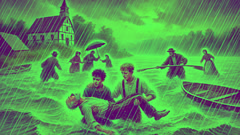
“Max, Moritz—you have mocked our laws, hurt our livelihoods, and made fools of us all,” declared Frau Stein, her voice trembling with emotion. “For every prank, there is a price.”
A hurried debate followed. Some called for leniency; others insisted on a harsh example. In the end, they settled on a punishment meant to teach and to warn: the boys would work off their debts to every victim. No pranks, no laughter—only toil. Day after day, Max and Moritz scrubbed floors, repaired fences, gathered eggs, and hauled water from the well. Their hands blistered and backs ached. The village watched, some with satisfaction, others with sorrow. The boys’ spirits dulled; their eyes lost their spark.
But even as they paid their penance, resentment simmered. A few villagers whispered that the punishment was too harsh, that the laughter had vanished from the square. Others said it was not enough, that mischief must be stamped out for good. The boys’ parents pleaded for mercy; their friends left secret gifts of bread or apples where the boys might find them.
One afternoon, as Max and Moritz cleared stones from Widow Bolte’s garden, a sudden storm swept in from the hills. Thunder cracked, rain lashed the earth. The boys dashed for shelter beneath a willow tree at the river’s edge. There, they found an old fisherman struggling to right his capsized boat. Without thinking, Max waded into the swirling water, Moritz grabbing a branch for support. Together, they hauled the man to safety, risking their own lives in the process.
News of their bravery spread quickly. The villagers gathered once more, this time not to judge but to thank. Herr Lamprecht spoke first. “Perhaps there is good in these boys yet,” he admitted. “Perhaps mischief is only one side of courage.” The elders agreed: Max and Moritz had paid for their crimes and shown true character when it mattered most. Their punishment was lifted.
With freedom restored, the boys returned to their old haunts—but something had changed. Their laughter was softer, their tricks gentler. They built a raft for the children to play on the river; they painted bright murals on the school walls. The village, sensing the shift, welcomed them back with cautious affection.
And so, Max and Moritz grew into young men. Their legend endured—retold around hearths on winter nights, immortalized in songs and sketches. Children learned from their tale: that mischief can bring joy or sorrow; that actions have consequences; that even the wildest hearts can find redemption. The village found its balance again, laughter and order living side by side beneath the old German sky.
Conclusion
The legend of Max and Moritz echoes through German culture not just as a tale of laughter and pranks but as a reminder of how communities shape and are shaped by those who dwell within them. Their journey from mischief-makers to outcasts and ultimately to reluctant heroes offers a mirror to our own struggles with rules, forgiveness, and the fragile line between freedom and responsibility. As children giggle at their escapades and elders recall the trouble they wrought, the deeper lesson lingers: even in the wildest spirits lies the capacity for change. The fields and forests of that old village remain, and sometimes—when twilight gathers and laughter drifts on the breeze—it’s easy to imagine two boys darting through the shadows, forever chasing adventure yet always tethered to the lessons of home.

